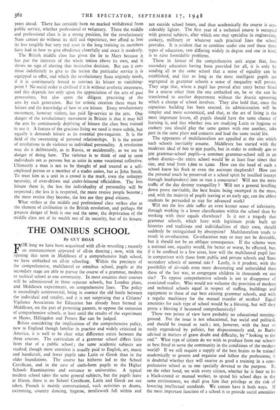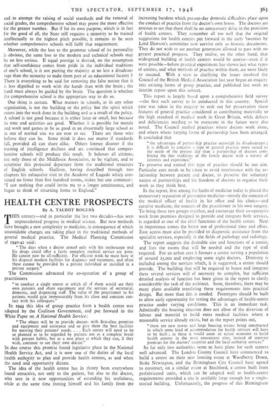THE OMNIBUS .SCHOOL
By GUY BOAS
FOR long we have been acquainted with all-in wrestling ; recently an announcement appeared of all-in dancing ; now, with the opening this term in Middlesex of a comprehensive high school, we have embarked on all-in schooling. Within the precincts of the comprehensive, multilateral or omnibus school, pupils at the secondary stage are able to pursue the course of a grammar, modern or techical school as one community. In most counties their courses will be administered in three separate schools, but London plans, and Middlesex experiments, on comprehensive lines. The policy is exceedingly controversial, being in essence the old battle between the individual and totality, and it is not surprising that a Citizens' Vigilance Association for Education has already been formed in Middlesex, on the part of protesting parents, to oppose the extension of comprehensive schools, at least until the results of the experiment at Hayes, Hillingdon and Potters Bar can be judged.
Before considering the implications of the comprehensive policy, new to England though familiar in practice and widely criticised in America, it is well to be clear what difference exists between the three courses. The curriculum of a grammar school differs little from that of a public school ; the same academic subjects are studied, though more attention is usually paid to English, art, music and handicraft, and fewer pupils take Latin or Greek than in the older foundations. The course has hitherto led to the School Certificate, and in the case of sixth-form pupils to the Higher Schools Examinations and entrance to universities. A typical modern school takes the same general subjects, but the pupils leave at fifteen, there is no School Certificate, Latin and Greek are not taken, French is mainly conversational, such activities as drama, swimming, country dancing, hygiene, needlework fall within and not outside school hours, and thus academically the course is con- siderably lighter. The first year of a technical course is occupied with general subjects, after which one may specialise in engineering, cookery, millinery or whatever such practical lines the school provides. It is evident that to combine under one roof these three types of education, two differing widely in degree and one in kind, is to raise formidable problems.
Those in favour of the comprehensive unit argue that, free secondary education having been provided for all, it is only by sending all to the same school that a sense of equality can be established, and that so long as the most intelligent pupils are segregated in grammar schools a sense of inequality will persist. They urge that, where a pupil has proved after entry better fitted for a course other than the one embarked on, he or she can be transferred to another department without the drastic uprooting which a change of school involves. They also hold that, once the capacious building has been erected, its administration will be simpler and more economical, and that, as the art of living is the most important lesson, all pupils should have the same chance of learning it, and that whether you are studying Latin or hygiene or cookery you should play the same games with one another, take part in the same plays and concerts and lead the same social life.
The opponents of multilateralism are appalled at the size which such schools inevitably assume. Middlesex has started with the moderate ideal of 600 to 950 pupils, but in order to embody aco to 500 grammar-school pupils—a common grammar-school roll in an urban district—the entire school would. be at least four times that size, and total from 1,600 to 2,000. How can the head of such a school know his flock or even the assistant shepherds? How can the personal touch be preserved or a school spirit be instilled (except through loudspeakers) into so vast a concourse? Will not the mere traffic of the day destroy tranquillity ? Will not a general levelling down prove inevitable, the best brains being swamped in the mass, and, with the majority of pupils leaving at an early age, can the ablest students be persuaded to stay for advanced work?
Will not the less able suffer an even keener sense of inferiority. through working in a lower classification within the school than by working with their equals elsewhere? Is it not a tragedy that grammar schools, which have with legitimate pride built up histories and traditions and individualities of their own, should suddenly be extinguished by absorption? Multilateralism tends to result in co-education. Co-education may or may not be desirable, but it should not be an oblique consequence. If the scheme were a national one, equality would, for better or worse, be effected, but, if it be confined to a few areas, how will the multilateral pupil fare in comparison with those from public and private schools and State secondary schools of normal size ? Lastly, is it prudent, with the possibility of air-raids even more devastating and unheralded than those of the last war, to congregate children in thousands on one site? To oppose comprehensive schools is not to disapprove of associated studies. Who would not welcome the provision of modern and technical schools equal in respect of staffing, buildings and equipment to those of our best existing grammar schools, and with a regular machinery for the mutual transfer of misfits? Equal amenities for each type of school would be a blessing, but will they prove a blessing if bestowed comprehensively?
These two points of view have probably no educational meeting- ground. For the issue is not educational, but social and political, and should be treated as such ; not, however, with the heat so easily engendered by politics, but dispassionately and, as Burke advised in matters of grave doubt and difficulty, by "looking to the end." What type of citizen do we wish to produce from our schools as best fitted to serve the community in the conditions of the modern world? If we still require a supply of the best brains to be trained academically to govern and organise and follow the professions, it is doubtful whether they will receive as good a training in a com- prehensive school as in one specially devoted to the purpose. If, on the other hand, we wish every citizen, whether he is later to he a black-coated or manual worker, to-spend his school days in the same environment, we shall give him that privilege at the risk of lowering intellectual standards. We cannot have it both ways. If the most important function of a school is to provide social amenities
and to attempt the raising of social standards and the removal of social grades, the comprehensive school may prove the more effective for the greater number. But if for its own purpose, which is in fact for the good of all, the State still requires a minority to be trained intellectually to the highest pitch possible, it remains to be seen whether comprehensive schools will fulfil that requirement.
Moreover, while the loss to the grammar school of its personality is obvious, the same loss to the modern and technical schools may be no less serious. If equal prestige is desired, on the assumption that self-confidence comes from pride in the individual traditions of one's school, is it not putting the majority at no less a disadvan- tage than the minority to make them part of an educational factory ? There is everything to be said for removing the false notion that it is less dignified to work with the hands than with the brain ; the hand must always be guided by the brain. The question is whether the comprehensive school is the appropriate way to do so.
One thing is certain. What matters in schools, as in any other organi,sation, is not the building or the policy but the spirit which enters into the work done in the building and as a result of the policy. A school is not good because it is either large or small, but because its tone and activities are good. Whether it is possible for morale and work and games to be as good in an abnormally large school as in one of normal size we are now to see. There are those who believe they can be. Some think it does not matter if standards fall, provided all can share alike. Others foresee disaster if the training of intelligence declines and are convinced that compre- hensive schools will produce this result. It behoves all citizens, not only those of the Middlesex Association, to be vigilant, and to scrutinise this projected departure from the traditional structure of English schools. Gulliver, having described through two chapters his exhaustive visit to the Academy of Lugado which con- tained no fewer than five hundred rooms, makes but one comment : "I saw nothing that could invite me to a longer continuance, and began to think of returning home to England."



































 Previous page
Previous page